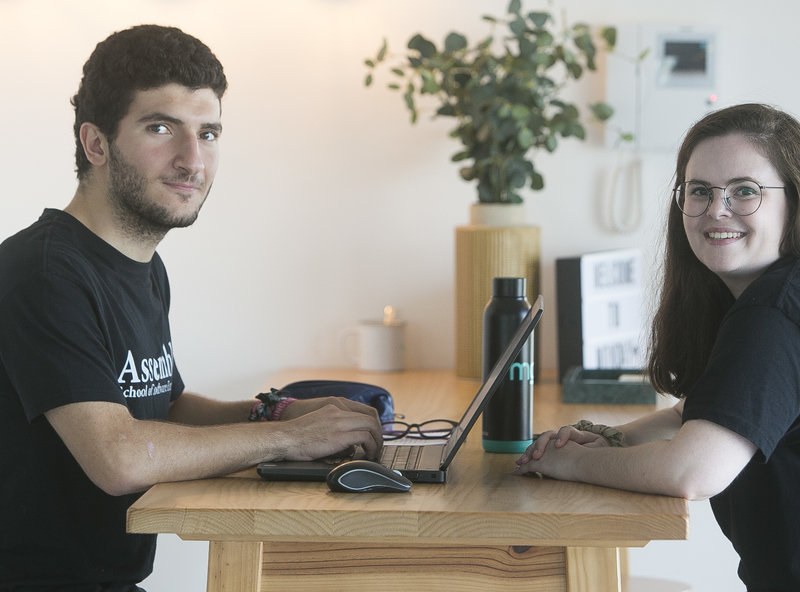The never-ending search for digital talent
While programmers qualify every year, demand far outstrips supply. The Assembler School in Barcelona is just one school aiming to provide highly-qualified professionals for a hungry business sector
A few months ago, Alaa Moucharrafie decided to give up a job that was “highly-paid” for someone in their early 20s – 32,000 euros a year – because he didn’t like the work. “At 21, I had a salary that allowed me to save 70% of what I earned, but I wasn’t happy. The company was very hierarchical and that wasn’t for me,” he says. Giving up good working conditions is something few young people these days can even consider – especially as it is not the case for most of them – but the difference with Alaa is that he is a programmer. In Spain, there are as many as 10,000 unfilled job vacancies due to the lack of IT graduates, even though those who do such a degree have a 95.6% chance of finding work. That is especially true of programmers, and the scarcity of such professionals is beginning to worry the business sector.
With business dynamism on the rise, the increasing gap between supply and demand must be filled so as not to stunt the growth of companies and cause costs to shoot up. That is why in recent times, a number of Barcelona schools, such as Ironhack, Le Wagon, Codeworks, Skylab and Ubiqum, have been offering intensive courses lasting months or even weeks to train new programmers with no previous knowledge. Also in the city, specialised schools are springing up, such as the Nuclio Digital School, set up by digital entrepreneur, Carlos Blanco. The latest addition to this growing ecosystem is the Assembler School, founded by Cristian Fondevila and Kasia Adamowicz, in conjunction with tech firms like Badi, Holaluz, Holded, Marfeel and Ulabox. The courses offered are only addressed at people with previous knowledge in programming, because the aim is to train highly-qualified professionals, who are necessary to guarantee competitiveness in the sector. The first course began in September and over nine months will focus on website development.
Alaa, who is now 22, is one of the students who signed up for the classes at the Assembler School. He is still finishing his degree in IT engineering – he hopes to graduate in June – but he is convinced of the need to have more tools at his disposal. “Any fellow student in the faculty will tell you that they teach you important things at university, but also that the theoretical knowledge is out of date; every year there are new revolutionary technologies and most professors have not been able to create a subject based on brand new technology,” he says. Alaa was sure he did not want to “commit myself to doing a really expensive masters.” That’s why, when he saw an ad for a school without teachers that does everything through projects, he thought it was “just what I needed”. What decided it for him was when he learnt there is no need to pay anything in advance. Students at the Assembler School pay for the course – 10,500 euros for the first – only after they have a job paying at least 24,000 euros a year.
Barcelona Digital Talent is a public-private body working, among other things, for the Mobile World Capital and the Catalan government. It was set up last year to help Barcelona attract and retain new digital talent. In March, it published a report that confirmed the dynamism of the sector but also its problems in finding professionals. The study said demand has shot up 40% in only a year, so that now one in 10 job vacancies in the greater Barcelona area is for the tech sector. Yet, at the same time, the number of digital professionals has grown little over 7%. Fondevila says they decided to set up in Barcelona because the city “has become one of the most entrepreneurial ecoystems and one of the most attractive places for technology companies in the world,” but he adds that the current training resources on offer are insufficient. “Neither the universities nor the bootcamps (very intensive courses that train people without previous experience) are training programmers with the capabilities and knowledge that companies really need,” particularly in certain areas.
A first step
The feeling of not being trained enough is something that Cristina Moreno identifies with, another student in the first masters at the new technology school. Cristina is 26 and studied design management, but when she saw that designers and programmers did not know enough, she decided to learn the whole process for herself. That’s why she signed up for a website development bootcamp in a Barcelona school, which meant in nine weeks she had the knowledge she needed to find work. “There they teach you to program from scratch; one of my fellow students was a miner,” she says. Yet, the problem with the bootcamp she says is “they teach you a stack, which is a group of programming languages, so that it gives you a foot on the ladder, but with limited knowledge.” For now, she just wants to “learn and learn, and the dreams will come later.” In fact, she recalls that she earned “very little” as a website designer and when she changed sector all of a sudden she realised that “hardly anyone gets these salaries or perks, like having a physiotherapist in the office.”
Today in Barcelona, the average salary for a professional in the digital sector is around 34,000 euros a year, although in the case of a senior programmer it can be double. Jordi Damià is the founder and CEO of Setesca, a consultancy that looks for people with a technological profile for other companies. Damià says that today “a programmer with experience can earn between 35,000 and 42,000 euros, but a senior consultant can earn 60,000 euros,” about the same a senior programmer gets, according to the sources consulted for this article. Although salaries go up 7% each year – compared to other sectors, in which salaries are at a standstill or even going down – they are “nowhere the salaries in other countries,” as in Switzerland they are three times higher, and twice as high in Germany, France and London. That, says Damià, is why so many global companies, such as Amazon, Facebook and Nestlé, are setting up bases in Barcelona, with more to come. The result, says the Setesca CEO, “is not that there’s a lack of professionals, but that it’s hard to find them if companies offer below the market price.” At Setesca, they are constantly looking for programmers to cover 150 vacant positions,” says Damià.
Teamwork
Mike Navarro, who has done website development since he was 14, says “to face the need for qualified staff, many firms set up internal training,” but that the problem is that “not all can afford it.” Navarro is a mentor and education head at the school, and he says the school is based on a collaborative methodology in which the student is their own teacher. “We want to break with traditional education in which someone who knows everything imparts what they know; students have to learn for themselves working with their peers,” he adds. There is a mentor to help when needed and the students work on real projects of the school’s partners.
Apart from companies like Badi, Holaluz, Marfeel and Ulabox, one of these partners is Holded, a startup founded almost four years ago to provide business management programs. Javier Fondevila, the group’s cofounder, confirms that there is a “brutal demand for labour” in the sector, and that not only are there few professionals, but even fewer with the experience and capacity to head projects. “The intensive programming courses have been very good for injecting dynamism into the sector, but they’re not the only solution,” he says. At Holded there are 50 employees – 20 are programmers – and Fondevila says that, despite the salaries they pay, “if the professional is good, the return is high.” In tech meccas like Silicon Valley, he says, wage costs are posing a problem for companies starting out, because the current annual salary there – the cost of living is also very high – is no less than 100,000 dollars.
technology






